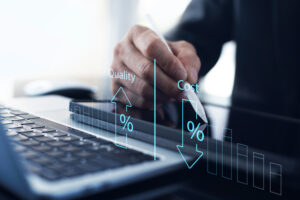Keeping Pace with the Industrial Internet of Things and ERP
When we think of the Industrial Internet of Things and ERP, there’s much to consider for today’s manufacturing and distribution organization.
Think of the Industrial Internet of Things as manufacturing or distribution related hardware and software that work together through “internet of things” style connectivity to track and enhance manufacturing and industrial processes. Innovations in connected manufacturing, sensors, machine learning and other advances all contribute to applications in the Industrial Internet of Things. It’s true business process transformation.
According to Techopedia, the Industrial Internet of Things uses sensors, machines, and devices that track and improve physical business processes in a manufacturing or industrial settings. This is contrasted to consumer-based “internet of things” which refers to any connected devices that fit the IoT model. For example, the consumer internet of things involves smart home devices like heating and cooling systems or security systems that are linked together to provide consumer conveniences.
Real World Scenarios of The Industrial Internet of Things and ERP
What’s in play when considering the Industrial Internet of Things and ERP?
These three examples in the industrial setting demonstrate the business benefits when sensors are embedded into different physical items such as production equipment or even finished goods.
- Heavy Duty Equipment: As an example of applications related to the Industrial Internet of Things and ERP, the magazine ComputerWorld recently featured the global heavy-duty manufacturer Caterpillar. The company builds telematics into a range of equipment like industrial gas turbines and diesel-electric locomotives for the construction industry and for diesel and natural gas engines. The telematics functions track production usage data which then flows seamlessly into MRO – maintenance, repair and operations systems. This integrated data is analyzed via business intelligence, and the data flow helps Caterpillar track performance across departments. Doing so reduces costs, creates better operating performance and improves future product development.
- Field Equipment: The field service management process is also going through a digital transformation when it comes to the Industrial Internet of Things and ERP. Today, companies can use sensors enabled by field service management software to let an organization know if an asset is broken, and automatically route it to the technician who has the expertise to go on-site and fix it.
- Food and Beverage: In another example from ComputerWorld, a US beer distributor uses a GPS-enabled system of sensors to monitor the quality of its craft beer and cider while products fly around the world in transit. Using satellite technology, the distributor can keep close watch on the temperature and pressure of its craft beer. This data is tracked and integrated across the enterprise to improve delivery, shipping and ultimately customer satisfaction. This level of functionality was a key reason why the US based craft producer was able to expand globally.
These are only three examples culled from many that demonstrate the integration of the data associated with Industrial Internet of Things and ERP systems.
What’s key here is the use of the data in the context of the overall business, which requires tighter integration with applications like ERP.
ERP Vendor Survey Findings
The Ultra independent ERP consultant team is always on the lookout for industry information related to the latest technology innovations. To that end, the software vendor IFS conducted a survey tracking the Industrial Internet of Things and ERP.
A study of 200 industrial companies shows that the Industrial Internet of Things, when well-integrated with business software like ERP, can facilitate digital transformation, drive revenue, reduce costs and increase competitiveness.
The study notes that while ERP systems have long focused on tying systems together, from plant floor to financial systems,” success depends ” on the ability of each company to extend IoT data from the plant floor or the field to the C-suite.” What’s needed is “direct communication between enterprise systems like ERP, enterprise asset management and field service management software and sensored devices on the plant floor–or distributed assets in the field.”
Those completing the survey indicated that enterprise software must facilitate IoT: “Direct communication between enterprise systems like ERP, EAM and field service management software and sensored devices on the plant floor–or distributed assets in the field–will be essential for organizations to achieve the more advanced use cases for IoT,” the IFS report states. While 58% of the most advanced companies can deliver IoT data through their process automation systems, only 34% are able to leverage data from their manufacturing execution systems, and 19% are able to correlate data with ERP systems.
Industrial Internet of Things and ERP: Vendor News
As ERP selection consultants, this data is of interest. Given the findings of not even 20% of manufacturers being able to correlate data from the Industrial Internet of Things with ERP systems, the vendor landscape is quickly changing.
SAP: SAP offers a comprehensive portfolio of solutions for the Internet of Things and ERP integration SAP’s platform lets manufacturing organizations and distributors develop, deploy, and manage real-time IoT and machine-to-machine (M2M) applications. The application enables an organization to manage and monitor remote devices while gathering real-time insights as well as develop IoT solutions for various line-of-business and industry use cases
Infor: Infor points to an example of the Industrial Internet of Things and ERP in action at a process manufacturing. There Infor case study summary how a processor uses advanced technology like GPS guidance systems to ascertain everything from equipment location to land utilization. This advanced data integration helps reduce waste, optimize labor, increase profits, and sustain the environment.
Plex Systems: Cloud ERP developer Plex Systems made an acquisition in an Industrial Internet of Things connectivity developer. Plex acquired DATTUS, provider of solutions that connect manufacturing equipment and sensors to the cloud.
The acquisition is expected to accelerate the ERP vendor’s ability to capture and leverage data from the millions of machines, sensors, and devices running in manufacturing operations around the world.
According to Richard Murray, chief product officer for Plex Systems, the acquisition lets the company “accelerate our mission to make machine connectivity as simple as adding a smart thermostat to your home. We see this as an opportunity for a major step forward in both connectivity and utilization of machine data to drive efficiency, performance, and innovation on the shop floor.”
These are only a few of the initiatives from ERP vendors now underway.
6 Software Selection & Implementation Pain Points + Solutions
Software selection and implementation processes often present challenges of their own. To steer you around trouble and help you drive success, Ultra’s experts compiled a list of pain points and solutions to be aware of as you embark on this journey.







